Trump supporters have tried to delegitimize Special Counsel Robert Mueller’s necessary investigation for crassly partisan purposes, writes James Kirchick. But it’s also true that Trump’s opponents, eagerly taking reports of each new crumb of circumstantial corroboration as ironclad proof of collusion, are rapidly delegitimizing the presidency, our government, and democratic processes. This piece originally appeared in the Washington Post.
During the 2016 presidential race, then-candidate Donald Trump signaled his spiritual kinship with Russian President Vladimir Putin, basking in the thought that Putin “calls me ‘brilliant.’” A startling web of connections emerged between the Kremlin and various Trump associates. According to a declassified intelligence community report released two months after the election, Russia conducted an influence operation during the campaign to “undermine public faith in the U.S. democratic process, denigrate Secretary [of State Hillary] Clinton, and harm her electability and potential presidency.” It did this by hacking Democratic Party email accounts, weaponizing the information by furnishing it to WikiLeaks and amplifying it on social media. Trump cheered this on, publicly imploring the Russians to hack Clinton’s emails, saying “I’d like to have them released.”
Following the election, a narrative began to take shape: Agents of the Russian government coordinated with representatives of the Trump campaign, Russian interference was a key factor in swinging the election to Trump, Trump may be personally indebted to Russian interests via financial liabilities or compromised by sexual blackmail, and, with Trump in the White House, American foreign policy is being manipulated by the Kremlin. The word “collusion” became a household term. For some Trump critics, every action or utterance of his presidency—firings, tweets, executive orders—is analyzed through the prism of these presumptions, breathlessly anticipating special counsel Robert S. Mueller III’s nearly year-long Russia investigation will find a smoking gun validating it all.
Trump supporters, up to and including Trump himself, have tried to delegitimize Mueller’s necessary investigation for crassly partisan purposes—with the president constantly professing innocence while routinely acting guilty. But it’s also true that Trump’s opponents, eagerly taking reports of each new crumb of circumstantial corroboration as ironclad proof of collusion, are rapidly delegitimizing the presidency, our government, and democratic processes.
In their haste to brand President Trump a tool, they’re unwittingly doing the Russians’ work for them: validating the notion that our democracy is a sham.
In their haste to brand President Trump a tool, they’re unwittingly doing the Russians’ work for them: validating the notion that our democracy is a sham.
While Russia clearly preferred Trump to Clinton, so far no one has produced conclusive evidence showing that the Trump campaign colluded with the Russian government. In her recent Washington Post review of “Russian Roulette: The Inside Story of Putin’s War on America and the Election of Donald Trump” by Mother Jones’s David Corn and Yahoo! News’s Michael Isikoff, currently topping bestseller lists, NPR’s Mary Louise Kelly rightly notes that the book offers, “No proof of collusion, no evidence that Russia changed the outcome of the 2016 election, no revelation that fundamentally revises our understanding of the trajectory of events.”
Yet Rep. Adam B. Schiff (D-Calif.), the ranking Democrat on the House Intelligence Committee and by now a cable-news fixture, insists there is “ample evidence in the public domain on the issue of collusion,” though he’s never cited anything of the sort. Rep. Ted Lieu (D-Calif.) suggests that a “cloud of treason” hangs over the Trump administration. Former CIA director John Brennan insinuated that Russia is blackmailing the president, a grave accusation, of which he later conceded, “I do not know if the Russians have something on Donald Trump.” Meanwhile, film director Rob Reiner has recruited former intel chiefs James R. Clapper Jr. and Leon Panetta to sit on the advisory board of his “Committee to Investigate Russia,” which might be necessary were the FBI, House, Senate and Mueller not already doing just that.
But while Trump’s rhetoric leaves him open to suspicion, his policies are a different matter. In the same congratulatory phone call, Trump didn’t mention Moscow’s apparent use of a military grade chemical weapon to carry out an assassination on British soil. On Monday, however, as part of a coordinated response with our most important allies, the U.S. expelled 60 Russian diplomats and ordered closed the Russian Consulate in Seattle. After calling NATO “obsolete” in 2016, Trump’s Defense Department in 2017 proposed a boost in financial support for the alliance; he’s announced the sale of antitank weapons to Ukraine; and, according to reports, U.S. military forces recently killed “at least 100” Russian mercenaries in Syria.
Yet so attached to the collusion narrative are some Trump critics that their theories are impervious to countervailing data. When Trump announced former U.N. ambassador John Bolton as his next national security adviser and video emerged of Bolton speaking to a Russian gun rights group, Sen. Tim Kaine (D-Va.) tweeted:
Can John Bolton even get a security clearance? Ties to Russian allies of Vladimir Putin?https://t.co/7eri6tYN9A
— Tim Kaine (@timkaine) March 25, 2018
Considering Bolton’s long, consistent record as a foreign-policy hawk on everything, including Russia, the charge is at best paranoid, at worst dishonest.
The internal incoherence of Russia-gate was most clearly revealed by Trump’s firing of Secretary of State Rex Tillerson. When Tillerson was nominated, many administration critics (myself included) expressed doubts about putting a former recipient of Russia’s Order of Friendship in charge of American diplomacy. “Choosing an oil executive friendly with Vladimir Putin as Secretary of State sends a disturbing signal about President-elect Trump’s priorities,” said House Minority Leader Nancy Pelosi in 2016. But when Trump dismissed Tillerson, right after Tillerson criticized Russia for the chemical attack, some of the same critics alleged it was due to his being too critical of Putin. Per Pelosi, “Secretary Tillerson’s firing sets a profoundly disturbing precedent in which standing up for our allies against Russian aggression is grounds for a humiliating dismissal.” You really can’t make this stuff up.
If Trump and his die-hard followers (such as the 49 percent of Republicans who believe Russia didn’t meddle in the 2016 election) exist on one extreme—dismissing evidence of unethical or even possibly illegal behavior as “fake news”—much of the so-called Resistance exists on the other, refusing to recognize the president as legitimate. Of Trump, Democratic National Committee Chairman Tom Perez declared in a speech last year, “You didn’t win this election.” No doubt thanks, at least in part, to incessant conspiracy theorizing, 57 percent of young Americans viewed Trump as illegitimate in a March 2017 poll. Mueller’s investigation hasn’t concluded, but in a December 2017 poll, 70 percent of Democrats said they favor impeachment proceedings. In 2016, Trump’s opponents rightly condemned him for repeatedly charging that the election was “rigged.” Today, those opponents lodge the same accusation, save for the perpetrators.
Trump critics have seized upon Mueller’s indictment of 13 suspects from the Internet Research Agency, a Kremlin-backed outfit charged with waging the 2016 disinformation campaign, as the exegesis of Russia’s decisive role in winning the election for Trump. While Moscow’s dirty tactics should be exposed and countered, the notion that Twitter bots and ersatz Facebook posts swung an American presidential race in which more than 135 million ballots were cast and more than $2 billion was spent—and the current hysteria over data firm Cambridge Analytica’s lifting of Facebook user information—demonstrates a remarkable lack of faith in the decisionmaking capacities of the American public.
The notion that Twitter bots and ersatz Facebook posts swung an American presidential race in which more than 135 million ballots were cast and more than $2 billion was spent…demonstrates a remarkable lack of faith in the decisionmaking capacities of the American public.
Maybe Cambridge Analytica does lie at the heart of a conspiracy to transfer voter data to the Russians, who then used it to micro-target voters in swing states. Maybe the president, whose underling paid off an adult-film actress not to speak of her encounter with his boss, is so deeply ashamed of the contents of the infamous “dossier” compiled by former MI6 agent Christopher Steele that he secretly agreed to begin a campaign for the presidency as a first-time candidate for any office and, on the off chance he won, surreptitiously advance Russian foreign policy objectives.
Maybe Trump was already in too deep with Russian money. His son, Eric Trump, once reportedly bragged that the Trump businesses “have all the funding we need out of Russia.” Trump looked for a deal to build a Trump Tower in Moscow. He worked with a Russian oligarch to put on the 2013 Miss Universe pageant. But none of these prove collusion, either.
Just as likely, the Russians favored Trump because he espoused a transactional foreign policy more amenable to Moscow’s aims than the liberal internationalism of his opponent, denigrated American allies and alliances, and behaved so appallingly on the campaign trail as to make a mockery of American global leadership.
As a writer who has devoted much of his career over the past decade to exposing all manner of Russian perfidy, up to and including being kicked off a live broadcast of Russia Today—and whose name appears on a list of 200 journalists targeted by the hacking group that broke into the Democratic National Committee’s servers—no one can mistake me for a Kremlin apologist.
I repeatedly railed against Trump’s candidacy throughout 2016, precisely on the terms of his pro-Kremlin rhetoric. To no avail. After being shocked by the choice of the American electorate, I eventually moved on, figuring that my efforts were best utilized analyzing the Trump administration’s foreign policies in a fair and judicious manner.
Others in my camp, however, won’t let go. They’ve convinced themselves that the president of the United States is beholden to a foreign power. Whatever the real story is—from my own sense that it’s explained by the authoritarian inclinations of two staggeringly cynical heads of state—to those who believe the special counsel is on the verge of unfolding a conspiracy so immense that it dwarfs any such venture in the history of man, it’s all speculative. Mueller should be given time to complete his investigation, and both sides should be prepared to accept findings that diverge from their assumptions.
In the meantime, we would all do well to keep in mind what the intelligence community determined to be Russia’s primary objective: “undermine faith in the U.S. democratic process.” By insisting, in the absence of conclusive evidence, that the president is not legitimate, that his administration is acting on behalf of a foreign adversary and that the election itself was determined by Russian interference, Trump’s critics are doing just as much to “undermine public faith in the U.S. democratic process” as wild-eyed Republicans rambling about a sinister “deep state.”
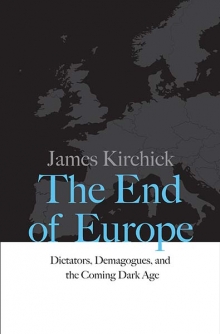
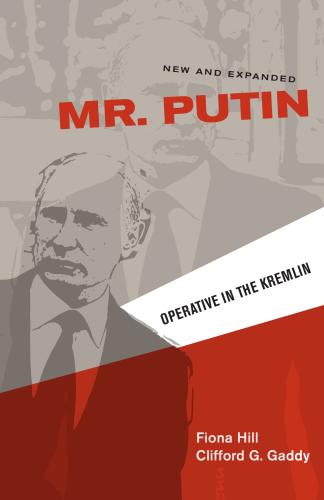
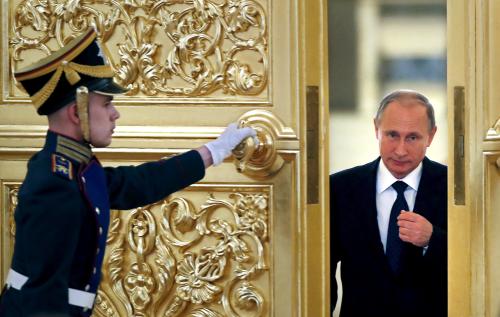
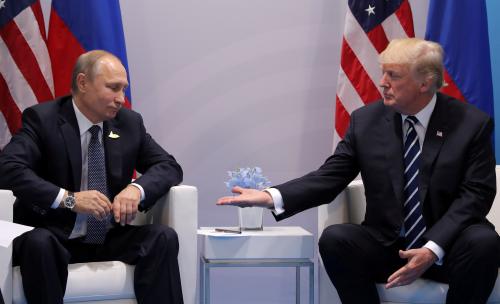
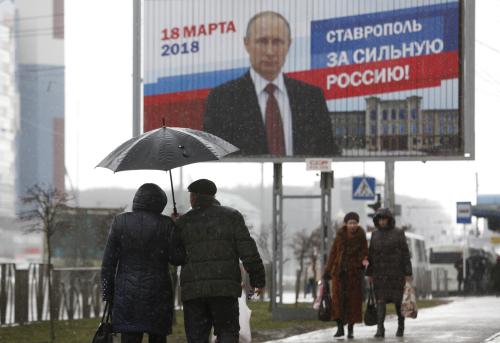



Commentary
Focus on actual U.S.-Russia relations, not the hysteria of Russia-gate
March 30, 2018